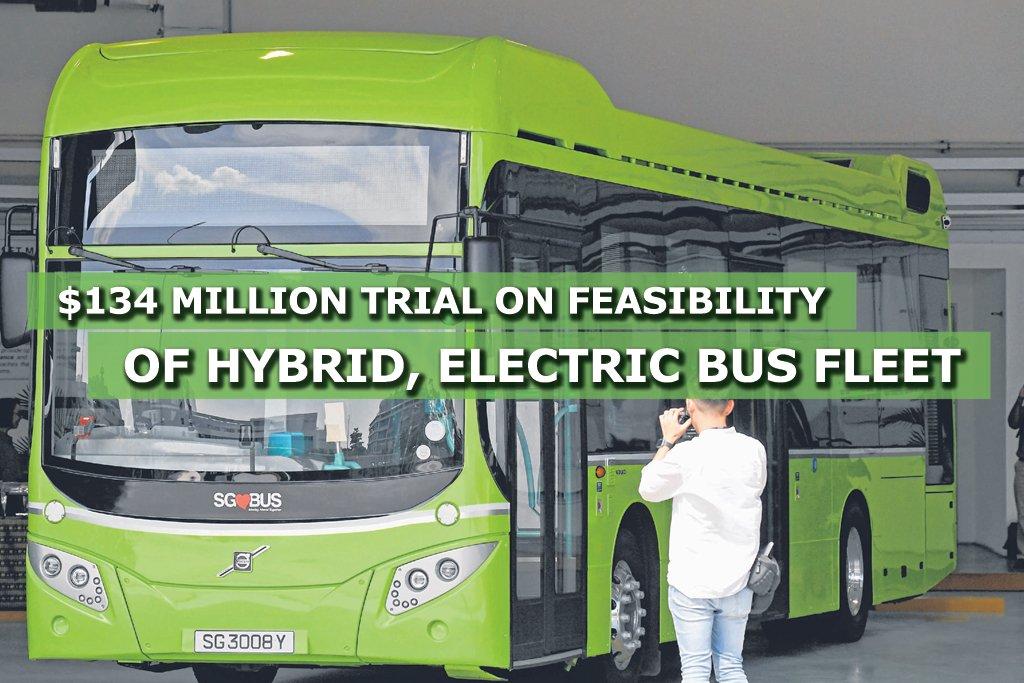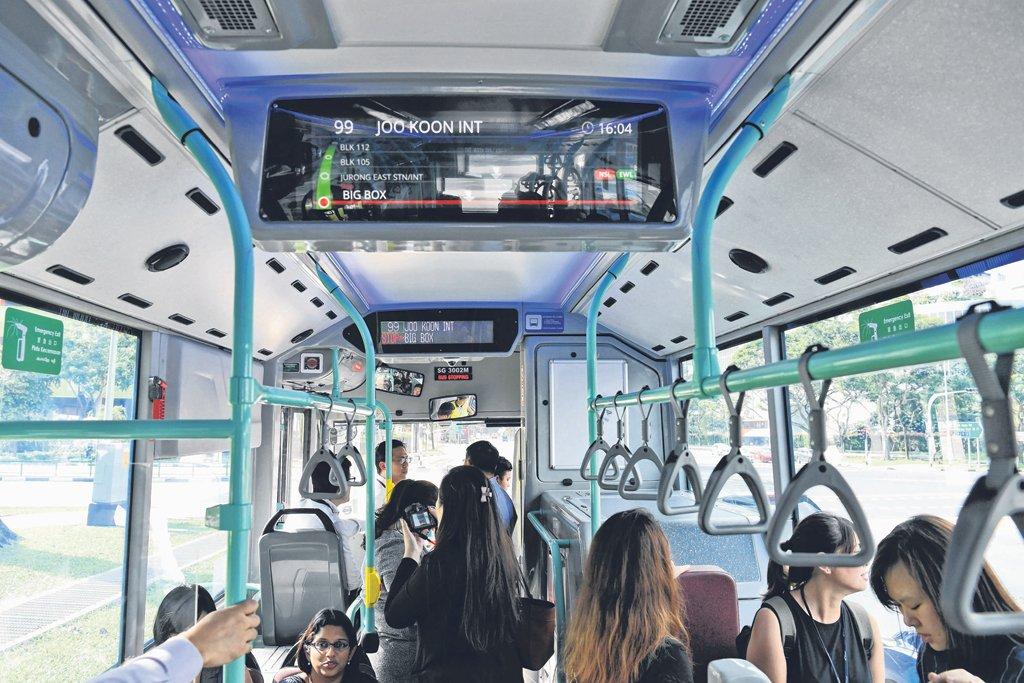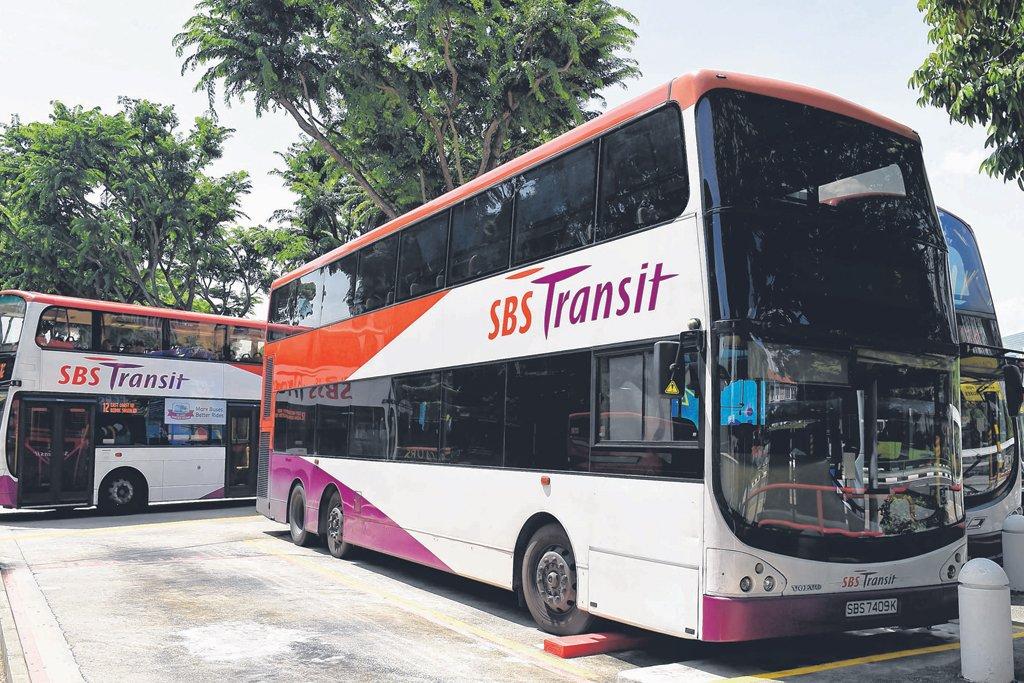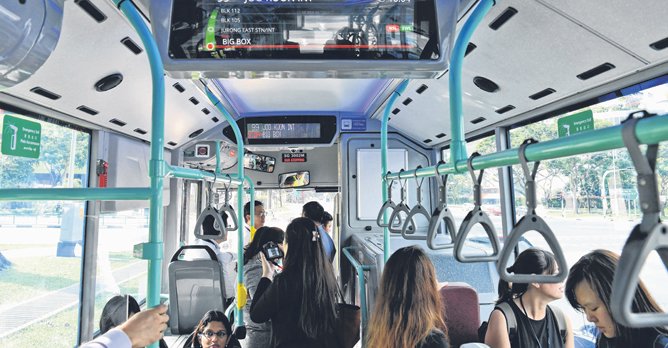$134 million trial on feasibility of hybrid, electric bus fleet
16 Mar 2019|2,696 views
The Land Transport Authority (LTA) is spending more than $130 million on a trial to see if diesel-electric hybrid and battery-powered public buses are feasible here - the first move towards an aim to convert Singapore's fleet of 5,400 buses to cleaner energy sources by 2040.
The figure of $134.44 million surfaced at this year's Budget, and pertains to the cost of rolling out 50 hybrid buses and 60 pure electric buses for a small scale trial here.
In a speech in Parliament during the debate on the Transport Ministry's spending plans last week, Senior Minister of State for Transport Janil Puthucheary said, "The Government will also take the lead in building a cleaner transport system. By 2040, we will upgrade all our public buses to cleaner energy sources."
In response to queries from The Straits Times, the LTA said the spending includes the installation of charging infrastructure to support the deployment of electric buses. A spokesman said, "The trial will allow us to understand the feasibility of using these buses in Singapore, in terms of operation and maintenance, and to determine the costs and benefits of using diesel hybrid and electric buses, as compared to diesel buses."
The first of the hybrid buses were deployed last December, while the electric buses will arrive and be put into service next year. The hybrid buses were supplied by Volvo East Asia, which won a $30 million contract to supply the vehicles in October 2017. They are being used for SBS Transit bus services 93, 272 and 59, among others.
The electric buses will be supplied by three parties for a total of $50 million. BYD (Singapore) and ST Engineering Land Systems were each awarded contracts for 20 single-deck electric buses worth $17 million and $15 million, respectively. Yutong-NARI Consortium was awarded an $18 million contract for 10 single-deck and 10 double-deck electric buses.
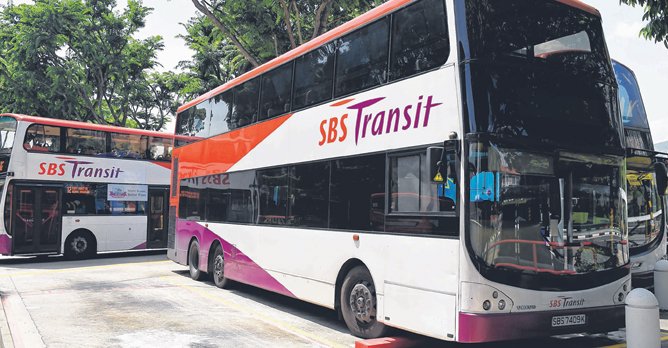
Transport Economist Walter Theseira of the Singapore University of Social Sciences said the investment is worth it because of the effects of diesel pollution, adding that Singapore will probably save more in health costs in the end. "Still, the appropriate study should be done to consider life-cycle costs, including external costs of emissions," he added.
In his Budget speech, Finance Minister Heng Swee Keat raised diesel duty at the pumps to $0.20 a litre, up from $0.10. "Diesel exhaust contains substantial amounts of particulate matter and nitrogen oxides, which are associated with an increased risk of lung cancer and respiratory infection," Mr. Heng said. "The long-term impact of excessive diesel use on the health of our family and children is significant."
An LTA spokesman said, "Based on initial findings from the ongoing diesel hybrid bus trial, fuel usage could be reduced by approximately 20% to 40%, compared to traditional diesel buses. This is a preliminary estimate and we will continue to monitor this as part of the trial."
The Land Transport Authority (LTA) is spending more than $130 million on a trial to see if diesel-electric hybrid and battery-powered public buses are feasible here - the first move towards an aim to convert Singapore's fleet of 5,400 buses to cleaner energy sources by 2040.
The figure of $134.44 million surfaced at this year's Budget, and pertains to the cost of rolling out 50 hybrid buses and 60 pure electric buses for a small scale trial here.
In a speech in Parliament during the debate on the Transport Ministry's spending plans last week, Senior Minister of State for Transport Janil Puthucheary said, "The Government will also take the lead in building a cleaner transport system. By 2040, we will upgrade all our public buses to cleaner energy sources."
In response to queries from The Straits Times, the LTA said the spending includes the installation of charging infrastructure to support the deployment of electric buses. A spokesman said, "The trial will allow us to understand the feasibility of using these buses in Singapore, in terms of operation and maintenance, and to determine the costs and benefits of using diesel hybrid and electric buses, as compared to diesel buses."
The first of the hybrid buses were deployed last December, while the electric buses will arrive and be put into service next year. The hybrid buses were supplied by Volvo East Asia, which won a $30 million contract to supply the vehicles in October 2017. They are being used for SBS Transit bus services 93, 272 and 59, among others.
The electric buses will be supplied by three parties for a total of $50 million. BYD (Singapore) and ST Engineering Land Systems were each awarded contracts for 20 single-deck electric buses worth $17 million and $15 million, respectively. Yutong-NARI Consortium was awarded an $18 million contract for 10 single-deck and 10 double-deck electric buses.

Transport Economist Walter Theseira of the Singapore University of Social Sciences said the investment is worth it because of the effects of diesel pollution, adding that Singapore will probably save more in health costs in the end. "Still, the appropriate study should be done to consider life-cycle costs, including external costs of emissions," he added.
In his Budget speech, Finance Minister Heng Swee Keat raised diesel duty at the pumps to $0.20 a litre, up from $0.10. "Diesel exhaust contains substantial amounts of particulate matter and nitrogen oxides, which are associated with an increased risk of lung cancer and respiratory infection," Mr. Heng said. "The long-term impact of excessive diesel use on the health of our family and children is significant."
An LTA spokesman said, "Based on initial findings from the ongoing diesel hybrid bus trial, fuel usage could be reduced by approximately 20% to 40%, compared to traditional diesel buses. This is a preliminary estimate and we will continue to monitor this as part of the trial."
Latest COE Prices
April 2025 | 2nd BIDDING
NEXT TENDER: 07 May 2025
CAT A$99,500
CAT B$117,003
CAT C$65,001
CAT E$118,001
View Full Results Thank You For Your Subscription.
